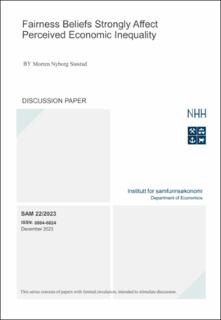| dc.contributor.author | Støstad, Morten Nyborg | |
| dc.date.accessioned | 2023-12-18T11:47:46Z | |
| dc.date.available | 2023-12-18T11:47:46Z | |
| dc.date.issued | 2023-12 | |
| dc.identifier.issn | 0804-6824 | |
| dc.identifier.uri | https://hdl.handle.net/11250/3108014 | |
| dc.description.abstract | This paper establishes a causal link from fairness beliefs to perceived economic inequality. I conduct an experiment where participants are asked to estimate various income inequality measures of hypothetical societies. While the true income distributions of the societies remain identical and simple, the description of the societies varies to indicate “fair” and “unfair” inequality across respondents. Describing the society as “unfair” increases the incentivized estimated top 10% income share as much as the actual difference between Denmark and the United States. Other inequality metrics are similarly affected. The findings imply that ideological beliefs fundamentally alter how people perceive economic inequality. | en_US |
| dc.language.iso | eng | en_US |
| dc.publisher | Institutt for samfunnsøkonomi | en_US |
| dc.relation.ispartofseries | DP SAM;22/2023 | |
| dc.subject | Fairness | en_US |
| dc.subject | Economic inequality | en_US |
| dc.subject | Income inequality | en_US |
| dc.title | Fairness Beliefs Affect Perceived Economic Inequality | en_US |
| dc.type | Working paper | en_US |
| dc.subject.nsi | Samfunnsvitenskap | en_US |
| dc.source.pagenumber | 15 | en_US |
| dc.relation.project | Norges Forskningsråd: 262675 | en_US |
